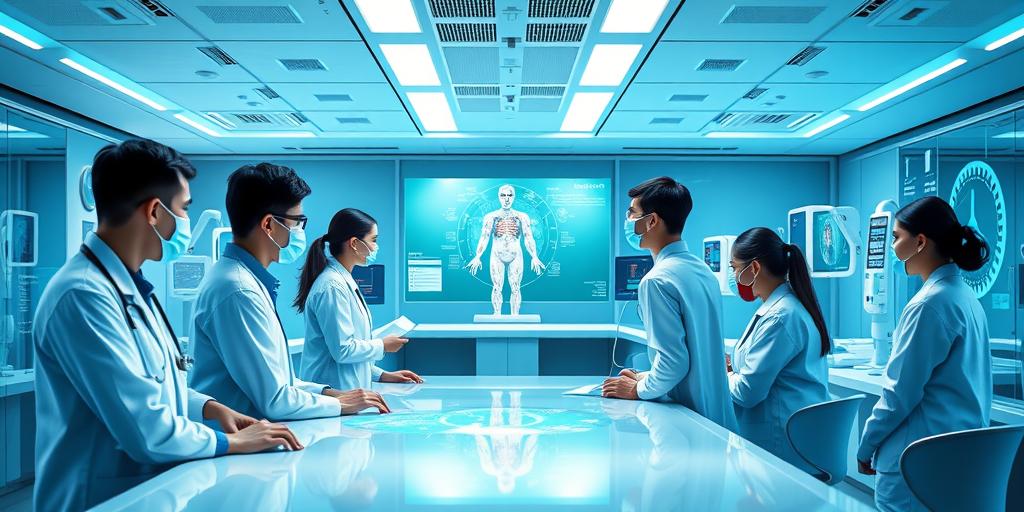The Future of Medical Education in India (2025)
India’s medical education system is on the cusp of significant transformation. By 2025, several key trends and initiatives are expected to reshape how healthcare professionals are trained and prepared for the challenges of modern medicine. This article examines the projected changes, focusing on curriculum updates, technological integration, skill development, and policy reforms.
Curriculum Modernization
The medical curriculum in India is undergoing a comprehensive overhaul to align with global standards and address contemporary healthcare needs. Key areas of focus include:
- Integrated Learning: Traditional subject-based silos are being replaced by integrated modules that emphasize interdisciplinary collaboration and holistic patient care.
- Early Clinical Exposure: Medical students are now exposed to clinical settings much earlier in their training, fostering practical skills and a patient-centered approach from the outset.
- Emphasis on Public Health: With India’s diverse public health challenges, the curriculum is incorporating more training in epidemiology, community medicine, and healthcare management.
- Mental Health Training: Addressing the growing need for mental healthcare, the curriculum includes specific modules on psychiatric disorders, counseling techniques, and stress management for healthcare providers.
Technological Integration
Technology is playing an increasingly vital role in medical education. By 2025, expect to see:
- Simulation-Based Training: Advanced simulation labs provide realistic, risk-free environments for students to practice surgical procedures, handle emergencies, and improve diagnostic skills.
- E-Learning Platforms: Online learning platforms offer access to a vast repository of medical knowledge, interactive modules, and remote learning opportunities, enhancing flexibility and accessibility.
- Artificial Intelligence (AI) in Diagnostics: AI-powered tools are being integrated into training programs to assist in image analysis, disease prediction, and personalized treatment planning.
- Telemedicine Training: With the growth of telemedicine, medical students will receive training in remote consultation, digital health technologies, and virtual patient management.
Skill Development
Beyond traditional medical knowledge, the future of medical education emphasizes the development of critical soft skills:
- Communication Skills: Training programs focus on improving doctor-patient communication, empathy, and cultural sensitivity.
- Leadership and Teamwork: Medical students are encouraged to participate in team-based projects, leadership workshops, and interprofessional collaborations to foster effective leadership and teamwork abilities.
- Research and Innovation: Promoting a culture of research, medical education institutions are integrating research methodologies, data analysis, and innovation challenges into the curriculum.
- Ethical and Legal Training: With increasing complexities in medical practice, training in bioethics, legal frameworks, and patient rights is becoming a core component of medical education.
Policy Reforms
Government policies and regulatory bodies are playing a crucial role in shaping the future of medical education:
- National Medical Commission (NMC): The NMC is driving reforms in medical education standards, accreditation processes, and curriculum guidelines to ensure quality and uniformity across institutions.
- NEET PG Reforms: Changes to the National Eligibility cum Entrance Test for postgraduate courses aim to streamline admissions, promote merit, and address regional disparities.
- Increased Investment in Infrastructure: Government initiatives are focused on upgrading medical college infrastructure, establishing new institutions, and expanding training capacities.
- Faculty Development Programs: Recognizing the importance of qualified faculty, policies are promoting faculty training, research grants, and mentorship programs to enhance teaching quality.
Challenges and Opportunities
While the future of medical education in India holds immense promise, several challenges need to be addressed:
- Faculty Shortages: Attracting and retaining qualified faculty remains a significant challenge, requiring innovative recruitment and retention strategies.
- Infrastructure Gaps: Many medical colleges still lack adequate infrastructure, equipment, and resources, necessitating substantial investment.
- Equity and Access: Ensuring equitable access to quality medical education for students from diverse backgrounds and regions is crucial.
Despite these challenges, the opportunities are vast. By embracing technological advancements, reforming curricula, and fostering skill development, India can transform its medical education system to produce competent, compassionate, and future-ready healthcare professionals.
Conclusion
The year 2025 marks a pivotal moment for medical education in India. With ongoing reforms, technological integration, and a focus on skill development, the system is evolving to meet the demands of a rapidly changing healthcare landscape. By addressing existing challenges and leveraging emerging opportunities, India can solidify its position as a global leader in medical education.
